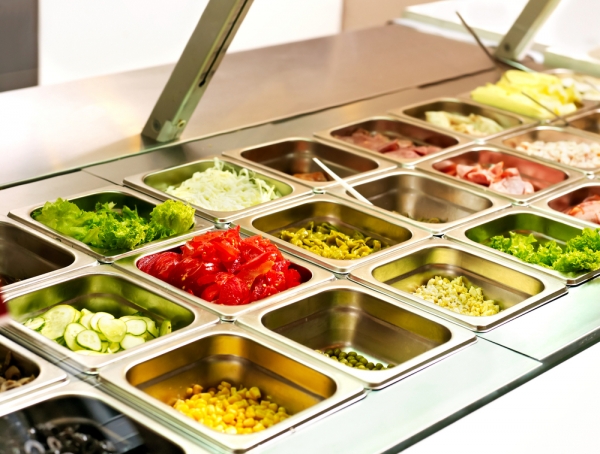I remember it like it was, well, about eight months ago; standing in the middle of campus, looking for a place to eat. Because this situation usually involved a time crunch, I would settle for the most convenient food option, healthy or not. It seems like a lot of college students, including myself, sacrifice healthy food for easy food as if the two are mutually exclusive. However, that isn’t true at all.
We’ve put together a list of healthy eating tips for college students based both on personal experience and input from students around the country. Try implementing a few, and see what a difference they can make!
Cafeteria/Dining Hall
- Don’t overdo it on portion sizes. Studies have shown that people who take larger portions will eat more food, whether they are hungry for it or not.
- Try not to eat the same thing every day. You may love the cafeteria French fries, but save them for a once-in-a-while indulgence.
- Don’t be afraid to ask questions about the food in the cafeteria or dining hall. The people who prepare and serve the meals may be able to help you find healthy options.
- Look for vegetarian or lighter options. For example, a cafeteria may not only offer hamburgers, but turkey and veggie burgers, too.
- Drink water with your meals instead of soda. Some cafeterias even offer water that’s been flavored with cucumber, orange or lemon slices.
- Many colleges have abandoned trays as a way to carry your meals. This practice can help you eat healthier by limiting the amount of food you can carry at once.
- Don’t fill your plate completely the first time you go through the cafeteria line. If you’re still hungry after you’ve finished what’s on your plate you can always go back for more.
- Just because the fast food, ice cream, comfort food, etc. option is there, doesn’t mean you have to eat it every meal.
Eating Off Campus
- Scope out the healthy food options in your college area before the school year gets really hectic. That way, you know where to go when you’re in a rush.
- Prepare meals in advance if you’re living on your own. It saves time and you can make the meals as healthy as you want. – Gracie Palmer, sophomore and cheerleader for Wichita State University
- Make menus. Having an idea of what you will eat through the week will help you stay on budget, and also help you be a little health conscious in your choices. – Chef Nisa Barns, culinary school graduate and college cookbook author
- Whatever size portion they give you in a restaurant, eat half and plan on getting a box. Or ask for the box first so that you can already save half and you won’t be tempted to eat it all. – Ellen Von Hoene, recent graduate
- Look up the menu of the restaurant you’re planning on eating at ahead of time and seek out the healthiest options so you’ll already have an idea of what to order. – Ellen
- If you’re ordering something heavy or carb ridden as a main meal, balance it with a lighter/healthier side. Example: don’t get fries, get the apple slices. – Ellen
Coffee & Cocktails
- For late nights or early mornings, try to drink coffee instead of sugary soft drinks or energy drinks. You might not notice those Mountain Dew cans piling up in your recycling bin, but your waistline certainly will! – Kristen Cummings, student and Marketing Intern for Whole Latte Love
- Try to drink your coffee black (or with limited cream and/or sugar). Sure those mochas and frozen lattes are a delicious way to wake up in the morning, but they are also packed with sugar, calories and fat. – Kristen
- Avoid cocktail mixers that are the same color as your nail polish – tons of empty calories and sugar in those.
- Have a glass of water between drinks. This will slow down your calorie consumption and help you avoid getting too drunk, too.
- If you are watching your figure, stick to wine or light beers which tend to be lower in calories and additives.
General Tips
- Keep a mini-fridge in your dorm room and fill it with water, fresh fruit and Greek yogurt.
- Try your hardest to eat a decent breakfast! Breakfast is the most important meal of the day, and gets you up and going. Starting your day off right with something in your tummy is so important! – Chef Nisa
- Eat when you are hungry and stop when you are full. Don’t overeat so much that you become stuffed. If there is something on your plate that you like more eat it first. Most often you try to save it for last after you have eaten everything else, and then by eating it you have just overeaten. – Brooke Barnum, senior at Wichita State University
- Eat lots of greens like salads and vegetables. Not only are vegetables nutritious, they also fill you up so you consume fewer calories. – Dennis Zaremski, All American on the Stanford men’s gymnastics team
- Avoid skipping meals as much as possible – college students often skip meals because they are lazy or just get sidetracked. Not only that, but when eating meals, they eat junk food like pizza, and it’s easy to gain weight. I always eat a salad with every meal. – Nihar Suthar, sophomore at Cornell University
- Have a few healthy snacks in your bag such as nuts or homemade trail mix. Having something on hand will help you resist the craving to grab something while you are out and about. – Chef Nisa
Also Read:
The 25 Healthiest College Campuses

